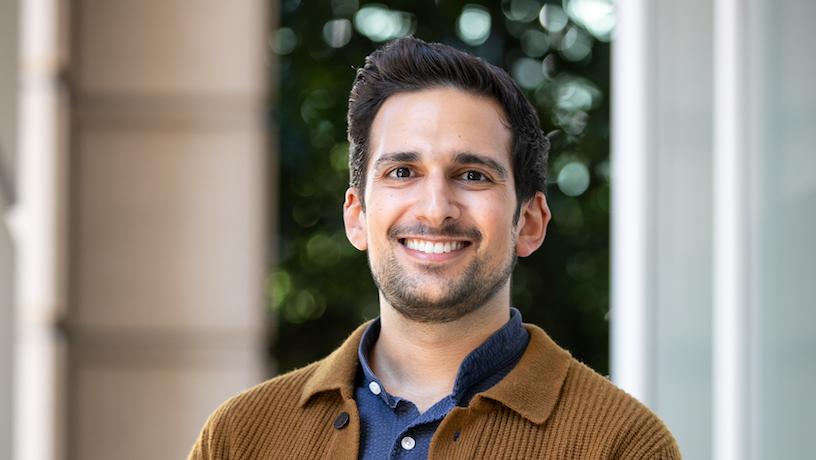Engineering the Immune System to Fight Cancer
Meet Assistant Professor Santiago Correa, an alum of our Rising Stars in Engineering in Health program whose innovative work intersects engineering and medicine.

Santiago Correa joined the faculty at Columbia Engineering in January 2023. He is an assistant professor in the Department of Biomedical Engineering and leads the Nanoscale Immunoengineering Lab. Credit: David Dini
During the COVID-19 outbreak in the spring of 2020, Santiago Correa joined the world in isolation, adjusting to quarantine life while continuing his biomedical research as a postdoctoral associate in the Appel Research Group at Stanford University. Little did he know that an experience in a new specialized program for postdocs and young investigators would soon land him on a path to Columbia Engineering.
Correa, an assistant professor of biomedical engineering, credits the Rising Stars in Engineering in Health program for deepening his interest in pursuing a career in biomedical engineering and academia. Established by Columbia Engineering in 2020 in close partnership with Columbia University Irving Medical Center (CUIMC), the Rising Stars program aims to educate, train, and empower the next generation of leaders in academia at the intersection of engineering and the biomedical sciences. Now in its fourth year, the program, which involves a two-day workshop led by Columbia faculty and its co-hosts, has since expanded to include partners Johns Hopkins University and Cornell. (This year’s in-person program is hosted at Cornell.)
“I remember [the program] being a nice break to finally be with other peers even though we were all virtual then,” says Correa, one of 20 selected for the inaugural Rising Stars cohort. “It was really helpful for me, especially since I was in the very early stages of considering whether I would go into the faculty job market.”
Immuno-engineering, nanotech, and the value of team science
Correa joined the Columbia biomedical engineering faculty in January 2023 and has established his lab in the Lasker Building at the medical center. Focused on the emerging field of immuno-engineering, Correa applies his expertise in nanotechnology development to modify biomaterials that can communicate with immune cells and effectively reprogram these cells to treat disease. His work at Stanford, prior to coming to Columbia, involved developing injectable hydrogels that stimulate the immune system to recognize and eliminate cancer.
Correa, who also is a member of Columbia’s Herbert Irving Comprehensive Cancer Center, is working with colleagues at both the Engineering School and at the medical center to leverage nanotechnology and biomaterials to reprogram the immune system to treat cancer and other diseases.
Unlike at Columbia, “A lot of times you’ll see that there’s a little bit of a disconnect between the medical side of a university and its engineers, even if that university has a really great and established biomedical engineering program,” he says.
“Being up in the medical center is perfect for the kind of research that I am doing. We need collaborative ties with basic scientists and clinicians who have these interdisciplinary skill sets that we all ultimately need in order to make these technologies actually clinically useful and feasible.”
This “team science” approach to biomedical engineering is fundamental to the way he runs his research group, and is even called out on the lab website. A first-generation Colombian American, Correa’s philosophy is that coalescing groups and teams of researchers with diverse backgrounds and fundamentally different training is crucial in this field.
“For me, I’m making it really clear that the research space that I'm carving out here at Columbia is a space where I think collaboration and teamwork is really essential for not only doing good work, but creating an environment where doing good work is possible.”
